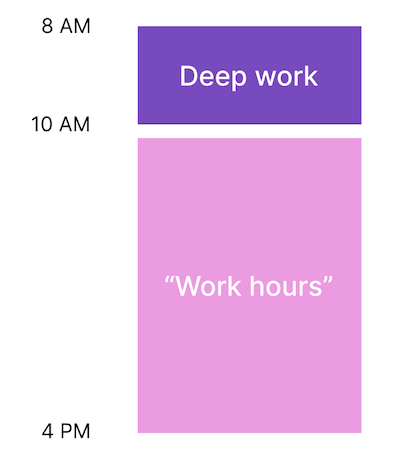Product managers are in a tough spot. On the one hand, there’s always more work to do than time to do it. On the other hand, PMs tend to be at the center of attention; often, they’re among the most distracted people in the company.
This creates a tough paradox.
To overcome it, PMs can embrace various tactics and strategies to not only survive, but thrive in such an environment. One of these tactics is embracing deep work slots.
Table of contents
- The problem with shallow work
- The solution: Deep work slots
- Benefits of deep work
- How to use deep work slots
The problem with shallow work
Product managers do two types of work:
- Deep work — Highly focused work intended to solve a complex problem
- Shallow work — Cognitively undemanding but often necessary tasks, such as checking emails and preparing status updates
Shallow work is often unavoidable, but it’s the deep work that genuinely moves the needle regarding both the performance of your product and your career development.
The table below highlights some examples of shallow work vs. deep work:
| Shallow work | Deep work |
| Participating in dailies |
Market and competitor research
|
| Asnwering Slack messages |
Strategic roadmap planning
|
| Writing updates |
Reviewing and analyzing product data
|
| Preparing presentations |
Customer interviews
|
The problem? Product managers are often so overwhelmed by the shallow work that they don’t have time to perform any significant, deep work. We’ve all been there.
You start your day with the intention of doing some competitive research, and then something disrupts your focus. For example:
- A UX designer needs to consult with you on some doubts
- A key stakeholder bombards you with questions about the latest initiative
- Another stakeholder has a feature request and you must figure out how to gracefully say no
- You realize documentation is not up to date
- Someone schedules an unplanned meeting
And so on.
The day finishes, and you realize you were super busy, but you didn’t do anything truly meaningful to move your product goals forward.
The solution: Deep work slots
Unless you work on weekends, you can’t avoid the daily havoc of a product manager’s work. If you can’t avoid it, plan around it.
The best way to actually do some meaningful, deep work every day is to have a dedicated, non-negotiable work slot.
The idea is to put aside an hour (or longer) every day dedicated only to deep work activities.
I’d distinguish two types of deep work slots:
- Predefined slots — For recurring deep work activities. For example, weekly market research or road mapping slots.
- Open slots — Time blocks without a clear, upfront purpose. After all, every week is different, and each one might call for a different type of deep work activity
For a deep work slot to be truly meaningful, it should meet two criteria. It must be:
- Focused on a singular, cognitively demanding activity
- Completely interruption-free
Booking an hour to go through an email isn’t deep work. Neither is doing market research while answering Slack every five minutes.
Benefits of deep work
There are numerous notable benefits of practicing deep work slots regularly. Below I’ll describe a few that impact product managers.
Deep work slots are beneficial because they:
- Develop and restore your ability to focus
- Combat impostor syndrome
- Help you make progress on important activities
Develop and restore your ability to focus
Product management job offers should come with a health warning: “Prolonged exposure might permanently damage your brain’s ability to focus.”
The constant multitasking, context-switching, and overcommunication make it increasingly hard to focus on a single topic for a prolonged period. In many cases, a PM’s urge to check their work Slack is stronger than a teenager’s urge to scroll through TikTok.
This prolonged, intense focus has serious long-term consequences. And the less focused you are, the lower quality outputs you produce.
Luckily, deep work slots are an excellent remedy for the attention problem. Just like going to the gym every day helps build and preserve muscles, practicing deep focus every day helps build and maintain the focus skill.
In the long run, that skill will be a great help in navigating the distracting days product managers face almost all the time.
Combat impostor syndrome
Product managers seem to be more susceptible to impostor syndrome than other roles. They often don’t “produce” anything tangible and drown in communication and shallow work.
Deep work slots help combat that impostor syndrome. After an hour or so of focused work, you can often see clear, tangible outcomes of your work. It might be a brand-new product requirements document, a clear, updated product roadmap, or a list of insights from market research.
Whatever it is, as long as it is truly meaningful, it will give you a strong dopamine hit.
If you repeat the deep work slot every day, you get that dopamine hit every day. This will help you fight off the impostor syndrome that probably sneaks on you every now and then.
Help you make progress on important activities
The most obvious benefit of the deep work slots approach is that it helps you make progress on your most important activities.
The brutal fact is, although you are probably overwhelmed with communication and ad hoc requests, which you can’t easily avoid, you are not paid to field and communicate ad hoc requests; you are paid to drive results.
But it’s hard to drive results while being distracted by a million fires around you. My recommendation? Don’t even try.
Deep work slots help you separate these two sides of product management. Use deep work slots to produce outcomes and drive results and the rest of the time for unblocking problems and helping the team drive their results.
How to use deep work slots
In theory, deep work slots are simple. But in practice, it’s easier said than done.
Here are some tips to help you successfully incorporate deep work into your daily schedule.
Schedule a deep work slot before you sign on
This is probably the most powerful tip I have: start your deep work before you start your official working hours.
For example, I work from 8 a.m. to 4 p.m., but I’m open to meetings and I start checking communication around 10 a.m. In other words, I’m not available for anyone between 8–10 a.m.

If your company requires you to be online eight hours a day, try to pitch the idea of working for two hours in stealth mode, or at least setting up “do not disturb” mode for the first few hours of the day.
If you work in the office, try to have an agreement that you work for 2 hours from home and then go to the office for the remaining 6 hours. Or, simply hide out somewhere in the office.
I tried incorporating deep work slots in the middle of the day a few times, but I never succeeded in the long-run. Something always came up.
Start slow
If you haven’t been practicing any deep work for a while, don’t block out two hours right away. It probably won’t work.
You can start with as little as 25 minutes of undistracted, focused work. It’s not as easy as it sounds, but once you get comfortable, keep increasing the length of the session until you find the sweet spot.
Get an accountability partner
Having an accountability partner does magic. I’d distinguish two types of accountability partners:
- General accountability partner — Set daily/weekly/monthly objectives with this person. For example, you can plan together what you want to achieve next week and use it as a driver to truly perform during deep work slots
- Situational accountability partner — For short-term, ad hoc accountability. For example, you could have a shared deep work session with a co-worker
I used to hop on a call with a coworker every day. We agreed on our goal for the session, and then we just worked in silence and summarized the session at the very end.
Accountability partners are not for everyone, but you should give them a try. If you can’t find a colleague interested in such an endeavor, you can try online services such as Focusmate.
Have a clear plan
You should know exactly what you plan to achieve during a deep work session the day before you have it. The worst thing you can do is begin your deep work slot and start figuring out what you want to do.
This is the fastest path to distraction and unfocused work.
I recommend you take the all-or-nothing approach. If you don’t have any complex, demanding task to tackle, then skip the deep work session. You want to train your brain to know that when you start your deep work session, it’s time to truly focus.
Don’t make exceptions
Treat your deep work slot like a meeting with the CEO or a doctor’s appointment. Would you reschedule these just because someone sent you an invite to a status meeting? Probably not.
Don’t treat these meetings as mere nice-to-have slots. Politely decline when someone tries to double-book your most important meeting of the day.
Of course, despite your best efforts, there will be some exceptions. For example, if your team has a full-day workshop, or if production is down and there’s an ad hoc firefighting meeting, you probably can’t skip that. Just make sure it’s truly an exception.
Don’t go overboard
Just be realistic. As a product manager, you won’t be able to do deep work for a whole day, every day. Accept this as a fact of life.
Summary
The product manager’s work day is littered with distractions, context-switching, and multitasking. Yet, PMs are still responsible for doing some complex, focus-intensive work.
One of the ways to balance these two facts is to implement regular deep work slots — time slots dedicated to distraction-free, focused work. These can help you progress on your most important initiatives and develop a much-needed sense of achievement. Plus, they are like a workout session for the brain.
Although implementing deep work slots isn’t as straightforward as it might sound, a few tactics make it easier, such as accountability partners, clear session plans, and scheduling your deep work slots outside of working hours.
Featured image source: IconScout
The post Deep work slots: How to stay focused and avoid distractions appeared first on LogRocket Blog.
from LogRocket Blog https://ift.tt/ZbmQloL
Gain $200 in a week
via Read more



